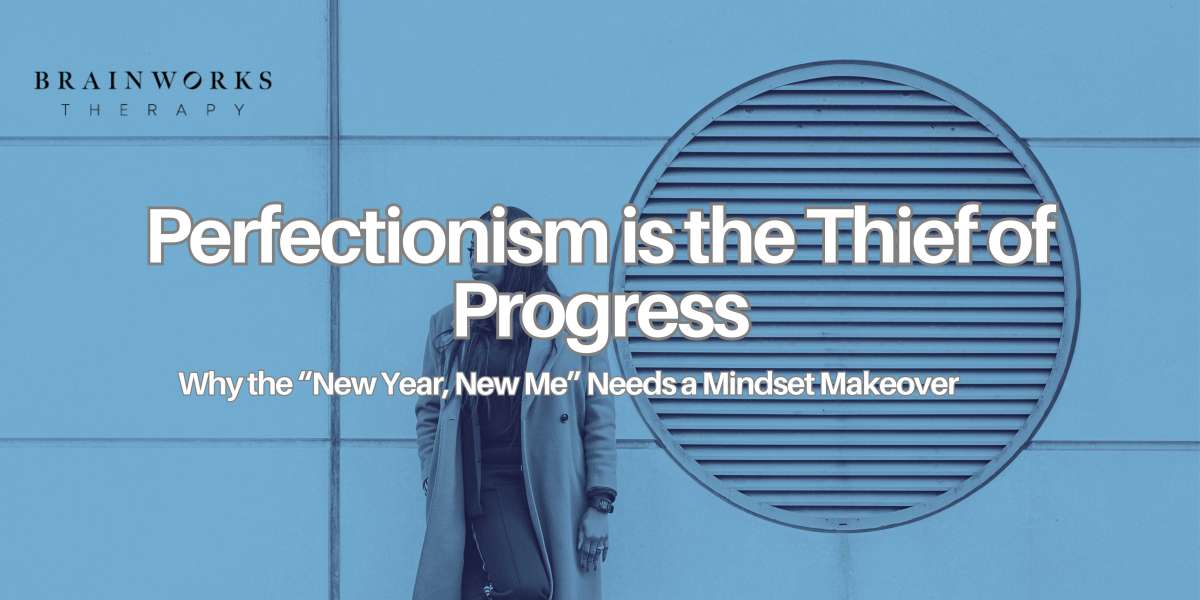It’s time to bin that “all or nothing” mindset and embrace steady progress, intention setting, and self-compassion instead. Let’s dig into why perfectionism keeps us stuck and how to break free using neuroscience-backed strategies.
Perfectionism: The Paralysing Myth
Perfectionism isn’t about striving for excellence, it’s about avoiding failure. And it’s fuelled by your amygdala, the part of your brain that governs fear and anxiety. This sneaky little thing keeps you stuck in a cycle of overthinking, procrastination, and self-doubt, because if you don’t try, you can’t fail, right?
But here’s the kicker: while you’re busy chasing perfection, your prefrontal cortex (the logical, problem-solving part of your brain) is shouting, “Just take one small step!”Unfortunately, perfectionism drowns out that voice, leaving you paralysed by the fear of “not good enough.”
The result? You either burn out trying to do everything perfectly, or you don’t even start. Neither will get you closer to your goals.
Why Resolutions Fail
The classic New Year’s resolution approach sets you up to fail because it’s built on rigid expectations. “I’ll lose 10 pounds by February.” “I’ll never eat chocolate again.” The second life throws a curveball, perfectionism swoops in to say, “Well, you messed up once. Might as well quit now.”
Instead, ditch the resolutions and focus on intentions. Intentions are flexible, forgiving, and rooted in progress, not perfection. For example, instead of saying, “I’ll go to the gym five times a week,” set the intention: “I’ll move my body in ways that feel good.” See the difference? One lets you grow, and the other traps you in a cycle of self-criticism.
Rewiring Your Brain for Progress, Not Perfection
If you’re ready to make this year about steady growth instead of chasing an impossible ideal, here’s how to start:
1. Focus on Small Wins
Every time you take an action, however small, your brain releases dopamine, a feel-good neurotransmitter that motivates you to keep going. Instead of aiming for perfection, aim for consistency. Can’t run 5K today? Go for a 10-minute walk. The key is to act, not overthink.
2. Ask Solution-Focused Questions
When perfectionism strikes, challenge it. Ask yourself, “What’s one small step I can take right now?” or “What would it look like to make progress without being perfect?” These questions shift your brain into problem-solving mode, activating the prefrontal cortex and quieting the fear-driven amygdala.
3. Reframe “Failure”
Your brain learns through trial and error, not flawless execution. Every misstep rewires your neural pathways, making you stronger and more resilient. Instead of beating yourself up for missing the mark, ask, “What did I learn from this?” Mistakes aren’t the enemy, they’re the building blocks of growth.
4. Set Intentions, Not Resolutions
Intentions are about how you want to feel and grow. They focus on the process rather than the outcome. Want to feel energised? Set the intention to prioritise sleep, nourishing food, and joyful movement. These are sustainable goals that allow for flexibility and self-compassion.
Steady Progress over Perfection
Here’s the truth: the “new you” doesn’t need a complete overhaul. You don’t need to be flawless, superhuman, or endlessly productive. You just need to show up with intention, take small, consistent steps, and celebrate your progress along the way.
Because at the end of the day, perfectionism is the thief of progress. And this year? You’re stealing it back.
So, let’s make 2025 the year of progress over perfection. Forget the resolutions, set your intentions, and start rewiring your brain for success, one imperfect step at a time.
Nicola xoxo
Who am I?
Nicola the owner and founder of Brainworks Therapy. She is an Award Winning Senior Specialist Psychiatric Nurse Solution Focused Hypnotherapist and Mindset Coach. With over two decades of frontline experience, she has a background in community, acute, judicial, and custodial psychiatric services. She has dedicated her career to helping people rewire their brains, change their mindsets, manage their emotions, better communicate, build resilience, and improve their overall mental health.









Charlotte Elizabeth 25 w
I'm definitely working on a done is better than perfect mentalitly, and i know perfect doesnt exist x